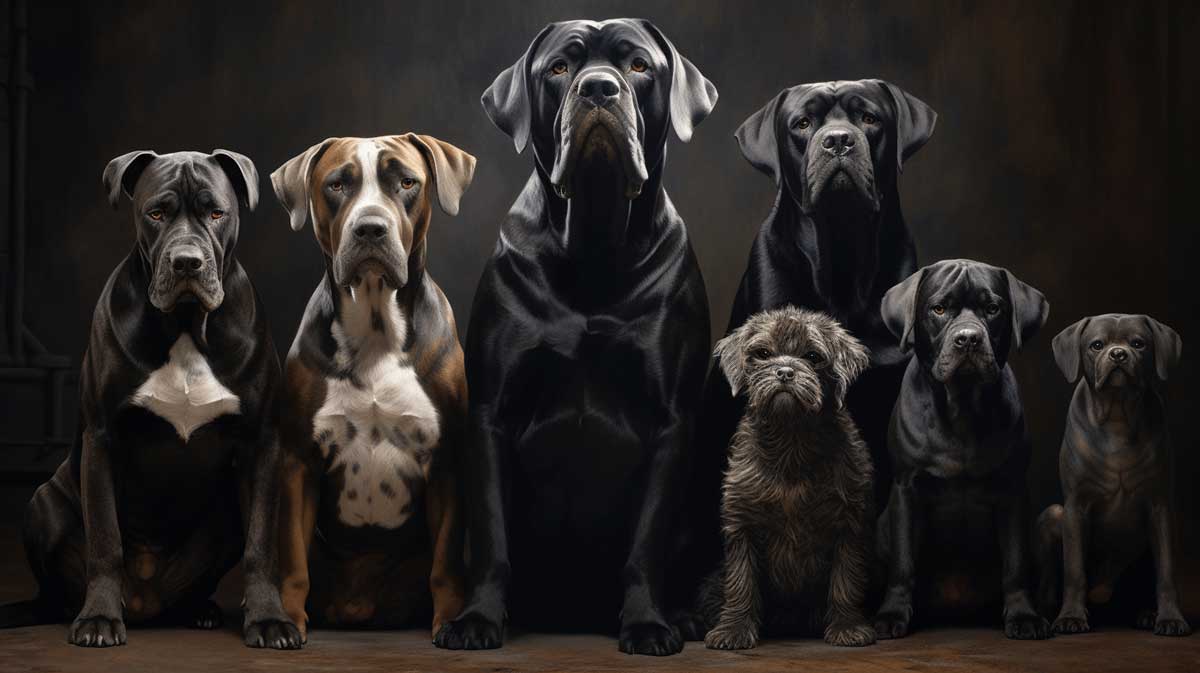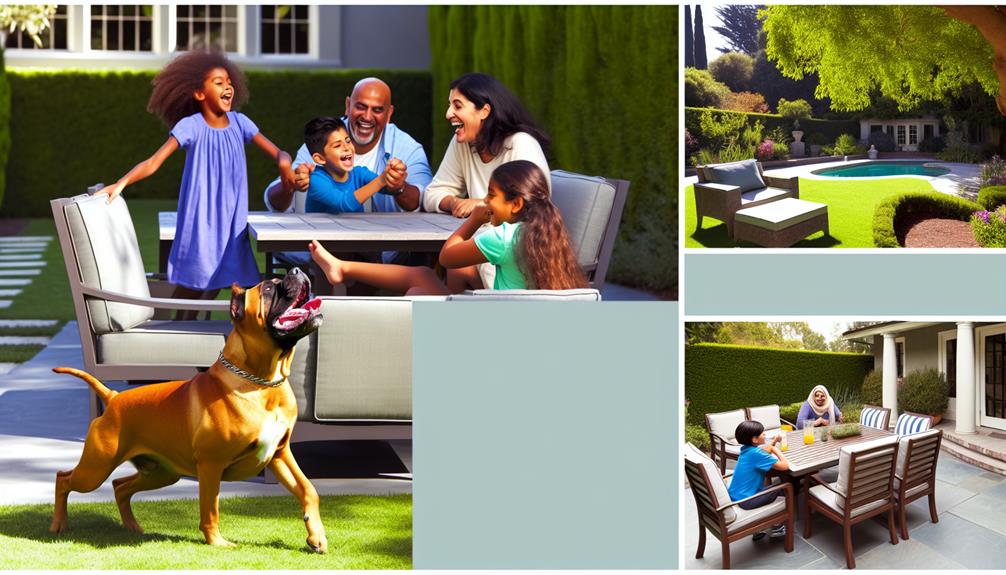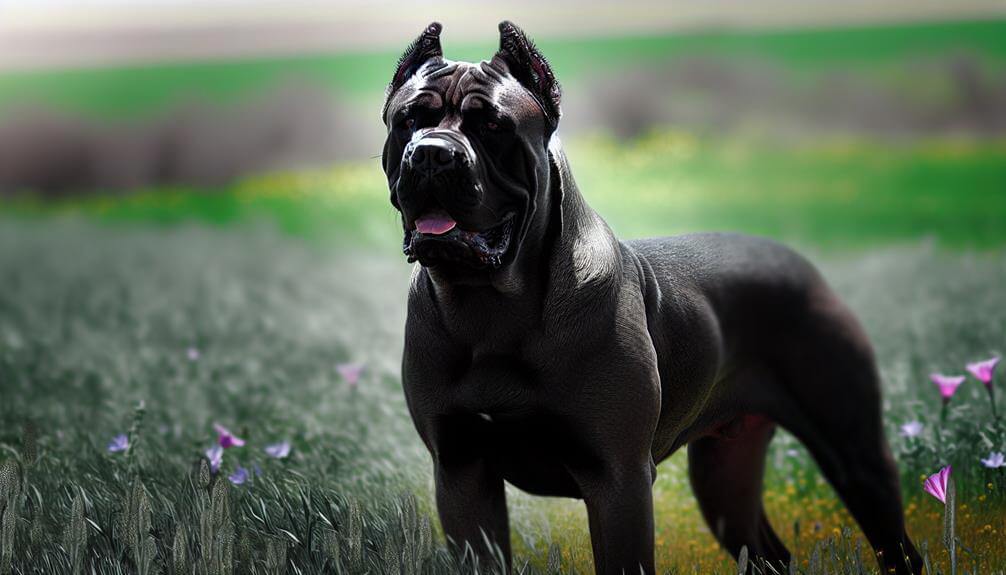I've got the inside scoop on the Neapolitan Mastiff versus the Cane Corso! Neapolitans are big with wrinkles and a laid-back vibe. Cane Corsos are slightly smaller, more athletic, and vigilant. Mastiffs are chill, loyal couch potatoes; Corsos are energetic protectors. To keep things tidy, Mastiffs need extra skin care, while Corsos have an easy-to-maintain coat. Corsos are brainiacs and easier to train, unlike the more stubborn Mastiffs. Each has its own health challenges and lifespan. Both breeds are fiercely loyal with strong guard instincts. Want to know more about these majestic Italian breeds?
Origin and History
The origin and history of the Neapolitan Mastiff and Cane Corso breeds trace back to ancient times, showcasing their rich lineage and significance in canine history.
The Neapolitan Mastiff, also known as the Mastino Napoletano, is an Italian breed with roots dating back to the Roman Empire, where they were used as war dogs and guardians. Their imposing presence and protective instincts made them a valuable asset in ancient battles.
On the other hand, the Cane Corso, originating from Italy as well, served a similar role as a versatile working dog, excelling in tasks such as guarding property and hunting.
Both breeds share a common ancestry in the Molossus dogs of antiquity, highlighting their enduring legacy in the canine world.
Size and Physical Appearance
Exhibiting robust frames and muscular builds, both the Neapolitan Mastiff and Cane Corso breeds command attention with their imposing size and distinctive physical characteristics.
The Neapolitan Mastiff is a giant breed, known for its loose, wrinkled skin and massive, heavy-boned structure. With a broad head, powerful jaws, and a pronounced dewlap, they exude strength and power.
In contrast, the Cane Corso is slightly smaller but no less impressive, boasting a leaner, more athletic build. They've a shorter coat, defined musculature, and a noble expression.
Despite their differences in size, both breeds share a commanding presence and an unmistakable air of confidence. From their muscular bodies to their striking features, these majestic dogs truly stand out in any crowd.
Temperament and Behavior
When observing the temperament and behavior of the Neapolitan Mastiff and Cane Corso breeds, one can immediately discern distinct characteristics that set them apart.
The Neapolitan Mastiff is known for its calm and laid-back demeanor, making it a gentle giant that's often seen as a loving and loyal companion. On the other hand, the Cane Corso possesses a more assertive and vigilant nature, displaying strong protective instincts and a natural wariness of strangers.
While both breeds are devoted to their families, the Neapolitan Mastiff tends to be more easygoing and affectionate, whereas the Cane Corso is typically more reserved and reserved in its interactions.
Understanding these differences in temperament is essential for anyone considering these magnificent breeds as potential pets.
Exercise and Activity Levels
In understanding the exercise and activity levels of these breeds, one must recognize their distinct energy requirements and physical capabilities.
The Neapolitan Mastiff tends to be more laid back and less active compared to the Cane Corso. While both breeds require regular exercise to stay healthy, the Cane Corso is generally more energetic and needs more physical activity to prevent boredom or destructive behavior.
Daily walks, interactive play sessions, and even agility training can help keep a Cane Corso mentally and physically stimulated. On the other hand, the Neapolitan Mastiff may prefer shorter walks and less strenuous activities.
Understanding these differences in exercise needs is essential in providing the appropriate level of physical activity for each breed to thrive and be happy.
Grooming and Maintenance Needs
Maintaining the grooming and maintenance needs of Neapolitan Mastiffs and Cane Corsos is essential for their overall health and well-being. Both breeds have short coats, but the Neapolitan Mastiff's dense, wrinkled skin requires extra attention. Regular brushing helps to keep their coat healthy and reduce shedding. Due to their skin folds, it's vital to clean and dry these areas thoroughly to prevent infections.
Cane Corsos have a shorter coat that's low maintenance, requiring minimal grooming. However, regular nail trims, ear cleaning, and dental care are important for both breeds. Keeping up with these grooming routines not only keeps them looking their best but also ensures they're comfortable and healthy.
Trainability and Intelligence
To truly understand the differences between Neapolitan Mastiffs and Cane Corsos, one must appreciate their distinct levels of trainability and intelligence. Cane Corsos are known for their high intelligence and willingness to please, making them relatively easier to train compared to Neapolitan Mastiffs. Their quick learning ability and strong desire to work alongside their owners make them excel in obedience training and tasks.
On the other hand, Neapolitan Mastiffs can be more independent and stubborn, requiring a patient and consistent approach to training. While they're intelligent dogs, their strong-willed nature may present challenges during training sessions. Understanding these differences in trainability and intelligence can help potential owners choose the breed that best aligns with their training capabilities and preferences.
Health Concerns and Lifespan
When examining the health concerns and lifespan of Neapolitan Mastiffs and Cane Corsos, it's important to explore their distinct genetic predispositions and average life expectancies.
Neapolitan Mastiffs are prone to certain health issues such as hip dysplasia, cherry eye, and bloat. Their average lifespan typically ranges from 7 to 9 years.
On the other hand, Cane Corsos are also susceptible to hip dysplasia, as well as eyelid abnormalities and heart problems. However, they generally have a longer lifespan compared to Neapolitan Mastiffs, living on average between 9 to 12 years.
Understanding these breed-specific health concerns can help owners provide the necessary care and early interventions to make sure their beloved pets lead long, healthy lives.
Guarding Instincts and Loyalty
Discussing the guarding instincts and loyalty of Neapolitan Mastiffs and Cane Corsos reveals their innate protective nature and unwavering devotion to their families. These majestic breeds aren't only powerful in stature but also in their commitment to keeping their loved ones safe. Here's why their guarding instincts and loyalty are truly remarkable:
- Protective Instincts: Both breeds have a strong sense of protection, making them excellent guard dogs.
- Family Devotion: Neapolitan Mastiffs and Cane Corsos are fiercely loyal to their families, forming deep bonds.
- Alertness: Their keen sense of awareness allows them to quickly respond to any potential threats.
- Courageous Nature: When it comes to defending their territory, these dogs show unwavering bravery.
Socialization and Interaction With Others
Exploring the social landscape with a Neapolitan Mastiff or Cane Corso reveals their distinctive approach to interacting with others.
Neapolitan Mastiffs tend to be more aloof and reserved around strangers, displaying a dignified demeanor. They're deeply loyal to their family but may take time to warm up to new people.
On the other hand, Cane Corsos are known for their confident and assertive nature. They're generally more outgoing and sociable, often showing a friendly attitude towards unfamiliar faces.
Proper socialization from a young age is essential for both breeds to guarantee they develop good manners and positive interactions with other dogs and people. Understanding these differences can help owners provide appropriate social experiences for their Neapolitan Mastiff or Cane Corso.
Suitability for Family Living
In considering the suitability of the Neapolitan Mastiff and Cane Corso for family living, it's important to understand their distinct temperaments and needs to make an informed decision that aligns with your lifestyle and preferences.
- Neapolitan Mastiff:
- Known for being gentle giants, they're loyal and protective of their family members.
- They require early socialization and training to manage their independent nature.
- Due to their massive size, they need ample space to move around comfortably.
- Their droopy skin and wrinkles demand regular cleaning to prevent skin infections.
Both breeds can be loving additions to a family, but the Neapolitan Mastiff might need extra attention and care due to its size and specific grooming needs.






